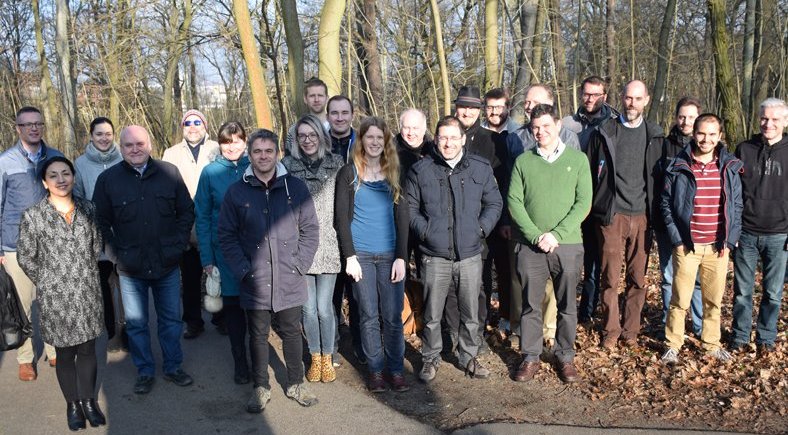GFZ leads Horizon 2020 project on space weather predictions
Stakeholders – such as satellite operators and manufacturers - require space weather predictions to have long lead times and confidence levels and that they should be tailored to particular engineering systems. These requirements will be addressed in the new PAGER project, led by the GFZ section ‘Magnetospheric Physics’ and funded under the EU Horizon 2020 program. In this project, the consortium consisting of five partners from Europe and the US will receive a total of 2.4 million Euros, out of which 1.1 million Euros will be provided to GFZ. The kick-off meeting took place in Potsdam at the end of January.
PAGER stands for ‘Prediction of Adverse effects of Geomagnetic Storms and Energetic Radiation’. To utilize available measurements and to address the space weather needs, the researchers will combine state-of-the-art models covering all the way from the Solar surface to the Earth’s inner magnetosphere. They will also run ensembles of physics-based and machine-learning models to make predictions of the space weather conditions one to two days in advance. This innovative approach will allow the researchers to not only make predictions, but also to provide the relevant confidence levels. On top of that, predictive models will be blended with data by means of data assimilation.
The team includes the leading academic experts in space weather, while the advisory board consists of the heads of the space weather prediction centers of ESA, NASA and NOAA. (ph)
Further information:








![[Translate to English:] Torsten Sachs in front of a climate station on a field](/fileadmin/_processed_/3/9/csm__TorstenSachs_bearbeitet_GS_4a1365ef84.jpeg)

![[Translate to English:] left image flood at the Ahrtal: image from above, several houses are flooded; left image:: Heidi Kreibich;](/fileadmin/_processed_/4/4/csm_Bild2_9af0130e9f.png)



![[Translate to English:] Start der Vega Rakete](/fileadmin/_processed_/6/4/csm_20231201-kachel_Vega-VV23-launch_ESA-CNES-Arianespace_706716b68c.jpeg)









![[Translate to English:] Poster exhibition at the Brandenburg Hydrogen Day at the GFZ, some participants in the foreground](/fileadmin/_processed_/6/5/csm_Erster_Brandenburgischer_Wasserstofftag_GFZ_402fcec95e.jpeg)
![[Translate to English:] Group picture of the participants](/fileadmin/_processed_/9/4/csm_20231108_CAWa-Workshop-Tashkent_Gruppenbild_99ea779d8a.jpeg)

![[Translate to English:] [Translate to English:] Hörsaal](/fileadmin/_processed_/e/6/csm_H%C3%B6rsal_e21ac645fb.jpeg)


![[Translate to English:] The Delegations in the Historic Library on the Telegrafenberg. In the back there are from left to right, the Dutch Ambassador for Germany, Ronald van Roeden, the Dutch Minister for Education, Culture and Science, Robbert Dijkgraaf and the scientific director of the GFZ, Susanne Buiter.](/fileadmin/_processed_/d/b/csm_Kachel-2_9eba4b4212.jpeg)

